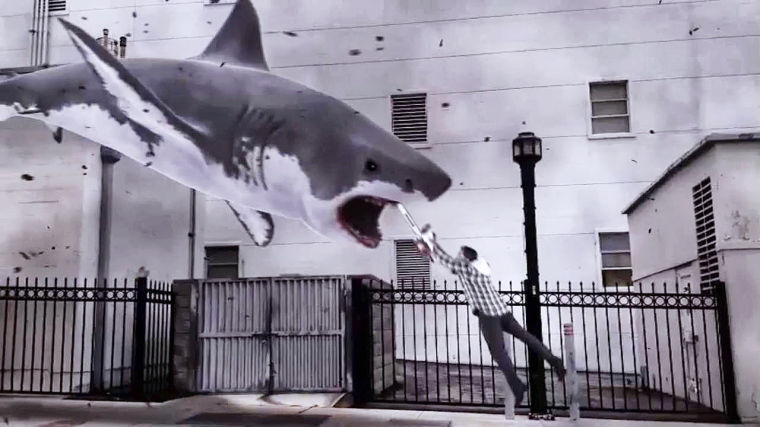
Too depressing to be fun, Sharknado offers little beyond the core concept.
The Asylum may be as surprised by Sharknado’s effect on the Twitterverse as you are. The studio behind a decade and a half’s worth of reliably awful, cheapo exploitation films has long lingered in the peripheries of pop culture, only briefly venturing into the limelight when someone on Reddit notices a movie titled Atlantic Rim at the Redbox or when an image of Mega Python vs. Gatoroid leaks onto the Internet.
Nothing, however, has quite captured the Internet’s imagination like Sharknado, a heavily advertised SyFy TV movie about waterspouts filled with sharks attacking California. It’s not hard to see why.
However, the actual experience of watching Sharknado is an oddly deflating one.
Qualitywise, the movie’s a wash. Objective worth is, of course, irrelevant for B-movies, so dinging Sharknado for inconsistent color grading, choppy visual effects and basement porno-grade acting would be pointless. What I mean is that Sharknado is only average as far as schlock goes.
The movie’s about on par with a middlebrow Ed Wood or Roger Corman flick: not nearly as seismically awful as, say, Manos: The Hands of Fate or Birdemic: Shock and Terror or as endearingly campy as a bad Friday the 13th sequel. Were it not for the core concept, Sharknado would’ve drowned a quiet death in Redboxes across the land.
But the central conceit does end up keeping the movie afloat. It’s not just the over-the-wall wackiness of it, but the sadness lingering below the surface that makes Sharknado such a weirdly compelling package.
Much like Tommy Wiseau’s The Room, Sharknado is the act of a serial hack rending his soul out for world to gawk and guffaw at. The extreme amount of self-awareness on show here builds to an admission of sorts, a mea culpa that winking trash is all its makers are capable of.
Make no mistake — the profoundly depressed souls behind this endeavor know you’re laughing at them. In fact, they’re probably getting paid handsomely for your scorn. Yet the money can’t totally dull the filmmakers’ existential depression.
It comes across in the final product. Every once in a while, you can see all of the actors staring at the same point with immense fear: not the fear taught in an acting class, but the creeping realization that if any of them ever got their own Wikipedia entries, Sharknado would be the only word on the page.
Consider the thin plot wrapped around the shark-tornado escapades: Four or five sad-hack tropes embark on a suicidal quest to save Los Angeles from a “terrifying” threat. It’s wish fulfillment, plain and simple: a dream that wannabe nobodies well past their prime could, with the help of a remarkably idiotic deus ex machina, still make something meaningful of themselves and their lives.
A sly recurring joke about how one of the characters is surprised that the seemingly young main protagonist has an ex-wife, teenage daughter and grown-up son counts as Sharknado’s sole subtle element, a jab at the copious makeup and plastic surgery employed on actors to mask the ravages of time.
The last image of the movie poignantly summarizes the fantasy: The surviving protagonists, now conveniently paired with previously estranged loved ones, face a ruined Hollywood, free to bask in their hard-won glory and rebuild the city in their own image.
Who would offer up such nakedly personal and revealing make-believe for strangers to snark at, other than someone who has completely given up?
Sharknado was a lot sadder than I expected. Minus the finale’s chainsaw antics, there’s not much glee or energy to the movie, not much interesting or funny wretchedness to the awful computer graphics. Outside of a few all too brief snippets of genuine promise, Sharknado is a funeral dirge for its filmmakers’ dreams and their youth.
In other words, it’s much better than Mega Shark vs. Giant Octopus.
diversiondbk@gmail.com



